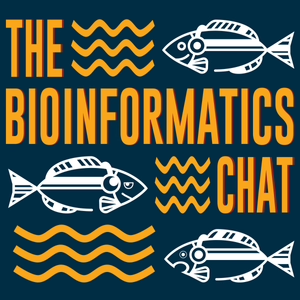
#67 AlphaFold and variant effect prediction with Amelie Stein
07/29/23 • 35 min
This is the third and final episode in the AlphaFold series, originally recorded on February 23, 2022, with Amelie Stein, now an associate professor at the University of Copenhagen.
In the episode, Amelie explains what ΔΔG is, how it informs us whether a particular protein mutation affects its stability, and how AlphaFold 2 helps in this analysis.
A note from Amelie:
Something that has happened in the meantime is the publication of methods that predict ΔΔG with ML methods, so much faster than Rosetta. One of them, RaSP, is from our group, while ddMut is from another subset of authors of the AF2 community assessment paper.
Other links:
- A structural biology community assessment of AlphaFold2 applications (Mehmet Akdel, Douglas E. V. Pires, Eduard Porta Pardo, Jürgen Jänes, Arthur O. Zalevsky, Bálint Mészáros, Patrick Bryant, Lydia L. Good, Roman A. Laskowski, Gabriele Pozzati, Aditi Shenoy, Wensi Zhu, Petras Kundrotas, Victoria Ruiz Serra, Carlos H. M. Rodrigues, Alistair S. Dunham, David Burke, Neera Borkakoti, Sameer Velankar, Adam Frost, Jérôme Basquin, Kresten Lindorff-Larsen, Alex Bateman, Andrey V. Kajava, Alfonso Valencia, Sergey Ovchinnikov, Janani Durairaj, David B. Ascher, Janet M. Thornton, Norman E. Davey, Amelie Stein, Arne Elofsson, Tristan I. Croll & Pedro Beltrao)
- A crime in the making: Russia’s atrocities — the podcast episode about the Olenivka prison massacre
If you enjoyed this episode, please consider supporting the podcast on Patreon.
This is the third and final episode in the AlphaFold series, originally recorded on February 23, 2022, with Amelie Stein, now an associate professor at the University of Copenhagen.
In the episode, Amelie explains what ΔΔG is, how it informs us whether a particular protein mutation affects its stability, and how AlphaFold 2 helps in this analysis.
A note from Amelie:
Something that has happened in the meantime is the publication of methods that predict ΔΔG with ML methods, so much faster than Rosetta. One of them, RaSP, is from our group, while ddMut is from another subset of authors of the AF2 community assessment paper.
Other links:
- A structural biology community assessment of AlphaFold2 applications (Mehmet Akdel, Douglas E. V. Pires, Eduard Porta Pardo, Jürgen Jänes, Arthur O. Zalevsky, Bálint Mészáros, Patrick Bryant, Lydia L. Good, Roman A. Laskowski, Gabriele Pozzati, Aditi Shenoy, Wensi Zhu, Petras Kundrotas, Victoria Ruiz Serra, Carlos H. M. Rodrigues, Alistair S. Dunham, David Burke, Neera Borkakoti, Sameer Velankar, Adam Frost, Jérôme Basquin, Kresten Lindorff-Larsen, Alex Bateman, Andrey V. Kajava, Alfonso Valencia, Sergey Ovchinnikov, Janani Durairaj, David B. Ascher, Janet M. Thornton, Norman E. Davey, Amelie Stein, Arne Elofsson, Tristan I. Croll & Pedro Beltrao)
- A crime in the making: Russia’s atrocities — the podcast episode about the Olenivka prison massacre
If you enjoyed this episode, please consider supporting the podcast on Patreon.
Previous Episode

#66 AlphaFold and shape-mers with Janani Durairaj
This is the second episode in the AlphaFold series, originally recorded on February 14, 2022, with Janani Durairaj, a postdoctoral researcher at the University of Basel.
Janani talks about how she used shape-mers and topic modelling to discover classes of proteins assembled by AlphaFold 2 that were absent from the Protein Data Bank (PDB).
The bioinformatics discussion starts at 03:35.
Links:
- A structural biology community assessment of AlphaFold2 applications (Mehmet Akdel, Douglas E. V. Pires, Eduard Porta Pardo, Jürgen Jänes, Arthur O. Zalevsky, Bálint Mészáros, Patrick Bryant, Lydia L. Good, Roman A. Laskowski, Gabriele Pozzati, Aditi Shenoy, Wensi Zhu, Petras Kundrotas, Victoria Ruiz Serra, Carlos H. M. Rodrigues, Alistair S. Dunham, David Burke, Neera Borkakoti, Sameer Velankar, Adam Frost, Jérôme Basquin, Kresten Lindorff-Larsen, Alex Bateman, Andrey V. Kajava, Alfonso Valencia, Sergey Ovchinnikov, Janani Durairaj, David B. Ascher, Janet M. Thornton, Norman E. Davey, Amelie Stein, Arne Elofsson, Tristan I. Croll & Pedro Beltrao)
- The Protein Universe Atlas
- What is hidden in the darkness? Deep-learning assisted large-scale protein family curation uncovers novel protein families and folds (Janani Durairaj, Andrew M. Waterhouse, Toomas Mets, Tetiana Brodiazhenko, Minhal Abdullah, Gabriel Studer, Mehmet Akdel, Antonina Andreeva, Alex Bateman, Tanel Tenson, Vasili Hauryliuk, Torsten Schwede, Joana Pereira)
- Geometricus: Protein Structures as Shape-mers derived from Moment Invariants on GitHub
- The group page
- The Folded Weekly newsletter
- A New York Times article about the Kramatorsk missile strike. The Instagram video, part of which you can hear at the beginning of the episode, appears to have been deleted.
If you enjoyed this episode, please consider supporting the podcast on Patreon.
Next Episode

#68 Phylogenetic inference from raw reads and Read2Tree with David Dylus
In this episode, David Dylus talks about Read2Tree, a tool that builds alignment matrices and phylogenetic trees from raw sequencing reads. By leveraging the database of orthologous genes called OMA, Read2Tree bypasses traditional, time-consuming steps such as genome assembly, annotation and all-versus-all sequence comparisons.
Links:
- Inference of phylogenetic trees directly from raw sequencing reads using Read2Tree (David Dylus, Adrian Altenhoff, Sina Majidian, Fritz J. Sedlazeck, Christophe Dessimoz)
- Background story
- Read2Tree on GitHub
- OMA browser
- The Guardian’s podcast about Victoria Amelina and Volodymyr Vakulenko
If you enjoyed this episode, please consider supporting the podcast on Patreon.
If you like this episode you’ll love
Episode Comments
Generate a badge
Get a badge for your website that links back to this episode
<a href="https://goodpods.com/podcasts/the-bioinformatics-chat-292186/67-alphafold-and-variant-effect-prediction-with-amelie-stein-38251722"> <img src="https://storage.googleapis.com/goodpods-images-bucket/badges/generic-badge-1.svg" alt="listen to #67 alphafold and variant effect prediction with amelie stein on goodpods" style="width: 225px" /> </a>
Copy




